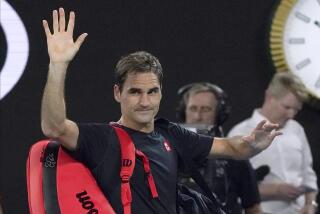Sir Alex Ferguson’s retirement leaves void in soccer world
- Share via
If Sir Alex Ferguson had stuck with his original plan, today we might be praising his pasta and Chinese noodles rather than his decision to start Robin van Persie over Wayne Rooney.
Or if he had chosen to pursue his interest in U.S. history, particularly the Civil War and the JFK assassination, he might have become a master teacher of men rather than a master motivator of them.
But then again, if Ferguson hadn’t passed on those two options to become the most successful coach in British soccer history, we wouldn’t be calling him sir. After all few chefs, and even fewer U.S. history buffs, get knighted by the queen.
Ferguson announced Wednesday he was stepping down as manager of Manchester United, ending an unparalleled 26-season run in which he won a record 13 English Premier League titles and transformed the franchise from an underperforming middle-of-the-pack team into one of world’s wealthiest and most popular professional sports brands.
And though Ferguson is 71 and talk of retirement has been swirling since 2002 —- when he said he was stepping down, then changed his mind and signed a contract extension — the news came as a surprise to many.
Ferguson, who is facing hip replacement surgery in July, told team officials of his plans in February, but the club kept it secret until Wednesday, when Ferguson told his players in a short but emotional team meeting just after 9 a.m. He then addressed his coaching staff while the club’s press office made a formal announcement on Twitter.
It read simply, “Sir Alex Ferguson retires. #thankyousiralex.”
Longtime rivals say Ferguson’s absence will create a noticeable void.
“Basically, the achievement is immaculate, when you look at the whole structure and consistency of the achievement. It is something exceptional,” said Arsene Wenger, who with 16 seasons at Arsenal, succeeds Ferguson as the longest-serving Premier League manager. “It is difficult to imagine English football without him, but it’s now a reality and a fact.”
Across the pond, ESPN soccer analyst Taylor Twellman tried to put Ferguson’s legacy in perspective for the colonists.
“For the American sports fan, this is John Wooden, Phil Jackson, Vince Lombardi all wrapped into one,” he said.
Well, not really. Not only did Ferguson win more league titles than Jackson’s NBA-record 11, but he won more than the NFL’s two winningest coaches — George Halas and Curly Lambeau — combined. Even the sainted Wooden, who won 10 NCAA championships at UCLA, couldn’t match Ferguson’s success.
Yet it would never have happened if a series of quirky events had not detoured Ferguson toward the end of his playing career in the Scottish League.
He had already sunk some of his soccer earnings into a spot where he planned to open a diner and had taken a kitchen job at a restaurant just down the road from his home to learn the business when, just days after playing his final game, he was offered a job as manager of a second-division Scottish club. It was a part-time position that paid $60 a week, and the team didn’t even have a goalkeeper. But Ferguson, then 32, was smitten.
And his reputation as a no-nonsense disciplinarian was already forming, with one player on that team saying he had “never been afraid of anyone before, but Ferguson was a frightening bastard from the start.”
Infamously short-tempered, “Furious Fergie,” as he became known, once fined a player for passing him while driving on a public road. But his trademark was the “hair dryer,” in which he would berate someone from such close range his breath would blow the player’s hair back. He let David Beckham know of his rage from longer distance, though, once kicking a soccer cleat across the dressing room and striking the star midfielder above the eye, causing a cut that required stitches.
At the end of the season it was Beckham, not Ferguson, who was forced to leave United.
Through it all, Ferguson won. At Aberdeen, his final stop in Scotland, he won 11 trophies — including three league titles and four Scottish Cups — in seven years. At United, which was headed for relegation when Ferguson arrived, he won 38 trophies, among them 13 Premier League championships, two Champions League crowns and five FA Cups.
In 1999 he won an unprecedented treble, capturing a league title, the FA Cup and the Champions League in the same season, capping a year that featured United becoming the richest and most valuable sporting brand in the world while Ferguson was knighted by Queen Elizabeth II.
So Sunday, a month after winning his fifth Premier League title in seven seasons and with precious little left to accomplish, Ferguson will manage his final game at Old Trafford, the aptly named Theatre of Dreams where the 26,000 seats on the stadium’s north side are called the Sir Alex Ferguson Stand. It’s the spot where, for the last six months, the entrance has been guarded by a 9-foot-tall bronze statue of Ferguson, arms folded and eyes fixed in a piercing stare.
Ferguson will manage his 1,500th and final United match on May 19 at West Bromwich Albion. Then, after his surgery, he’ll accept a reported $3-million salary to move into a vague role as a director and ambassador for the club. Another Scot, Everton’s David Moyes, will take his place on the sideline.
But Ferguson’s place in history will be much more difficult to fill.
“The decision to retire is one that I have thought a great deal about and one that I have not taken lightly,” Ferguson said. “It is the right time.”
twitter.com/kbaxter11







